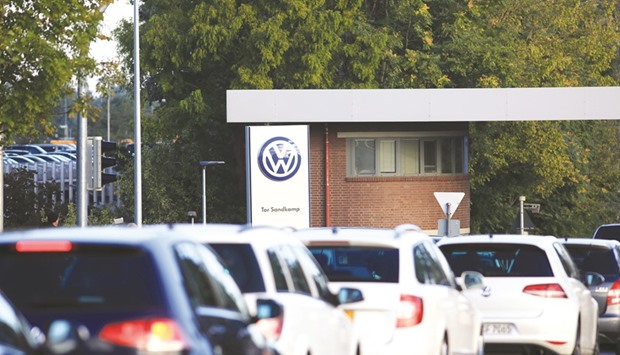The US Justice Department is assessing how big a criminal fine it can extract from Volkswagen over emissions-cheating without putting the German carmaker out of business, according to two people familiar with the negotiations.
The government and Volkswagen are trying to reach a settlement by January, the people said, before a new US administration comes into office and replaces the political appointees who have been overseeing the process.
The US is sizing up Germany’s biggest carmaker at the same time it’s trying to settle a civil case with the country’s largest bank, Deutsche Bank – two companies that, together, directly account for more than 320,000 German jobs. In the case of Deutsche Bank, which is seeking to settle US allegations over its crisis-era mortgage securities business, investors are asking whether the Justice Department would seek a penalty so high that it would leave Deutsche Bank short of capital, forcing it into a rushed sale of assets and stock. As the US’s Volkswagen calculations show, the department is showing that in some cases, it will take a company’s financial health into account.
It’s not clear what penalty range the US is considering in the criminal case against Volkswagen. The company had net liquidity of €28.8bn ($32.4bn) as of June 30, and Chief Financial Officer Frank Witter said his goal is to keep the target for average net liquidity at €20bn to ensure funding needs and protect the company’s credit rating. The carmaker generates several billions of dollars of cash each quarter and could tap into a credit line or raise capital if necessary to pay its obligations.
Volkswagen has already agreed to pay an industry-record $16.5bn in civil litigation fines in the US after admitting last year that its diesel cars were outfitted with a “defeat device” that allowed them to game US environmental tests. The carmaker is also on the hook for outstanding civil claims from several states and as much as $9.2bn in investor lawsuits in Germany, where it’s also under criminal investigation.
A Volkswagen spokesman didn’t have an immediate comment. Peter Carr, a Justice Department spokesman, declined to comment.
“The department doesn’t pick a number in a complete vacuum,” said William Stellmach, a former federal prosecutor now at Willkie Farr & Gallagher in Washington. “There are a number of cases where it has acknowledged that the impact of a financial penalty on a company was a factor in deciding what that penalty should be.”
In criminal prosecutions, the Justice Department may assess the impact of a charge or settlement on a business’s viability, and the resulting effect on shareholders and employees. A prosecution’s potential collateral damage is one of the factors the department considers under principles for prosecuting businesses laid out in the “US Attorney’s Manual.”
It’s not clear whether the department is making similar calculations as it negotiates a civil settlement with Deutsche Bank over its dealings in residential mortgage-backed securities. The German lender has been under US scrutiny along with other banks over its role in packaging and selling toxic debt that led to the 2008 financial crisis. Fines by the department for mortgage-backed securities alone total $41bn for five banks, with five more banks yet to settle, including Deutsche Bank. Press reports that the US began negotiations by asking it to pay $14bn to settle the case rattled markets as investors grew concerned about the bank’s ability to raise capital.
The ability-to pay assessment doesn’t necessarily result in a lower number, according to Stellmach, who isn’t involved in the VW case. Rather, the department can structure an agreement to soften some of the sting, such as an instalment plan allowing for deferred payments, he said. Companies can also receive credit for penalties assessed by other regulators or authorities both in the US and abroad.
VW has plenty of money to meet further fines, particularly because penalties tend to be paid over long time periods, according to Joel Levington, a Bloomberg Intelligence credit analyst.
“Despite all the damage that its reputation has taken, VW is still a company that might be back to generating $5bn in free cash flow in 2018, and when you generate that kind of cash, it absolves a lot of sins,” he said. The Justice Department began negotiations on the criminal penalty in August, one person said.
Volkswagen has been doing well, despite all of this. Although sales of VW-brand cars fell in the first half of the year, the German manufacturer has benefited from gains by its Audi, Porsche and Skoda brands, as well as its strong position in China. Volkswagen outsold Toyota Motor Corp in the first six months of 2016, making it the world’s biggest automaker for the period.
The sales gains have brought Volkswagen back to profitability this year and sparked a surge in its net liquidity, which is a tally of cash minus debt.
With the diesel-cheating scandal, Volkswagen has become one of the latest companies subjected to a Justice Department calculation of how severe a penalty needs to be to change corporate behaviour and deter other businesses from illegal conduct.

Volkswagen automobiles queue to enter its headquarters in Wolfsburg, Germany. The US Justice Department is assessing how big a criminal fine it can extract from Volkswagen over emissions-cheating without putting the German carmaker out of business.
